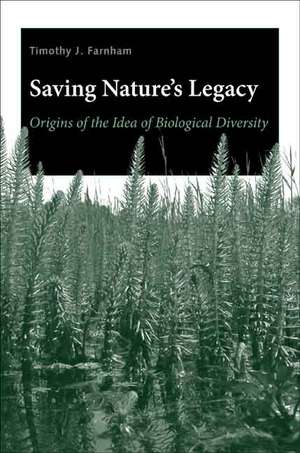Saving Nature's Legacy: Origins of the Idea of Biological Diversity
Autor Timothy J. Farnhamen Limba Engleză Hardback – 5 iun 2007
Biological diversity is considered one of today’s most urgent environmental concerns, yet the term was first coined only twenty-five years ago. Why did the concept of biological diversity so quickly capture public attention and emerge as a banner issue for the environmental movement? In this book, Timothy J. Farnham explores for the first time the historical roots of biological diversity, tracing the evolution of the term as well as the history of the conservation traditions that contributed to its rapid acceptance and popularity.
Biological diversity is understood today as consisting of three components--species diversity, genetic diversity, and ecosystem diversity. Farnham finds that these three tiers coincided with three earlier, disparate conservation traditions that converged when the cause of preserving biological diversity was articulated. He tells the stories of these different historical foundations, recounts how the term came into the environmental lexicon, and shows how the evolution of the idea of biological diversity reflects an evolution of American attitudes toward the natural world.
Biological diversity is understood today as consisting of three components--species diversity, genetic diversity, and ecosystem diversity. Farnham finds that these three tiers coincided with three earlier, disparate conservation traditions that converged when the cause of preserving biological diversity was articulated. He tells the stories of these different historical foundations, recounts how the term came into the environmental lexicon, and shows how the evolution of the idea of biological diversity reflects an evolution of American attitudes toward the natural world.
Preț: 439.09 lei
Preț vechi: 570.24 lei
-23% Nou
Puncte Express: 659
Preț estimativ în valută:
84.03€ • 87.50$ • 71.02£
84.03€ • 87.50$ • 71.02£
Carte tipărită la comandă
Livrare economică 08-22 martie
Preluare comenzi: 021 569.72.76
Specificații
ISBN-13: 9780300120059
ISBN-10: 0300120052
Pagini: 288
Ilustrații: 1 b-w illus.
Dimensiuni: 156 x 235 x 21 mm
Greutate: 0.62 kg
Editura: Yale University Press
Colecția Yale University Press
ISBN-10: 0300120052
Pagini: 288
Ilustrații: 1 b-w illus.
Dimensiuni: 156 x 235 x 21 mm
Greutate: 0.62 kg
Editura: Yale University Press
Colecția Yale University Press
Notă biografică
Timothy J. Farnham is assistant professor of environmental studies, University of Nevada, Las Vegas. He lives in Las Vegas.
Recenzii
“In examining an idea that is now driving conservation worldwide, Tim Farnham gets the story right in a way that no one else has. His book is richly detailed, yet catches the large themes beautifully.”—Elliott Norse, president, Marine Conservation Biology Institute
"This book contributes something unique to the literature of what might be called the history and philosophy of conservation. It treats the term and concept of biodiversity itself as its subject and provides an analytic and historical study of it."—J. Baird Callicott, University of North Texas
